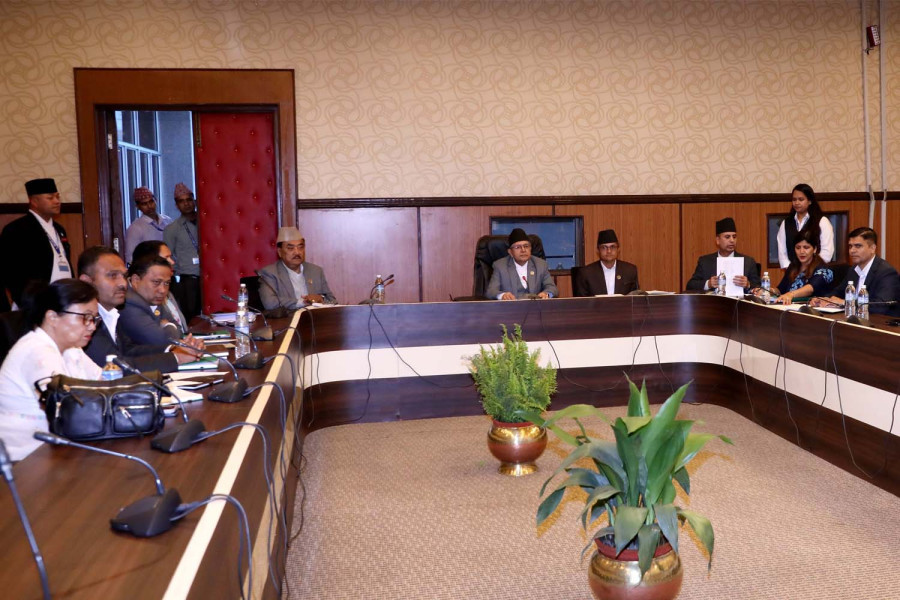National
Cooperative probe members bring up jurisdiction issue
The day committee formally started work, some members wanted consultations to see if it can probe all cooperatives.
Purushottam Poudel
The parliamentary special committee formed to investigate crisis-ridden cooperatives across the country started its work on Tuesday.
The panel constituted on May 28 with a four-point terms of reference (ToR), however, faced a constitutional question on the day it formally began its work, according to committee members.
The ToR mentions 20 cooperatives in Schedule 1 and nine in Schedule 2 for the committee to probe. Though the cooperatives listed in Schedule 1 come under the federal government, only one of the nine cooperatives mentioned in Schedule 2 comes under the jurisdiction of Singha Durbar. Hence questions about the jurisdiction of the committee formed by the federal parliament.
“We faced a constitutional question today on whether an investigation committee formed by the federal parliament can look into the cooperatives that are not under its jurisdiction,” Sishir Khanal, a committee member from Rastriya Swatantra Party, told the Post.
Lekh Nath Dahal, a CPN (Maoist Centre) member on the committee, also acknowledged the issue.
Of the 31,450 cooperatives across the country, around 1,500 come under the federal government. The others are under the watch of local or provincial governments. Many cooperatives, through which the Gorkha Media Network once run by Rabi Lamichhane, the incumbent home minister, allegedly rerouted the money to operate the Galaxy 4K television, come under local and provincial governments, Dahal said.
“In this context, we have a constitutional question of whether we can probe the cooperatives not under the federal government,” Dahal told the Post. “Today’s meeting decided to seek help from a legal expert to remove the difficulties.”
Cooperatives that have injected money into the Gorkha Media Network come under Schedule 2 of the ToR.
Listed under Schedule 2 of the ToR are: the Ideal Yamuna Multipurpose Cooperative, the Image Saving and Credit Cooperative, the Sahara Saving and Cooperative, the Samanta Saving and Credit Cooperative, the Sano Paila Saving and Credit Cooperative, the Supreme Saving and Credit Cooperative, the Suryadarshan Saving and Credit Cooperative, the Sumeru Saving and Credit Cooperative and the Swarnalaxmi Saving and Credit Cooperative.
Reportedly, money from Butwal-based Supreme Saving and Credit Cooperative, Suryadarshan Saving and Credit Cooperative of Pokhara, Sahara Saving and Cooperative of Chitwan, Swarnalaxmi Saving and Credit Cooperative of Kathmandu, Sano Paila Saving and Credit Cooperative of Birgunj, and Nepaljung’s Samantha Saving and Credit Cooperative has been rerouted to the Gorkha Media Network.
Legal experts say the constitution gives the federal government an exclusive mandate to regulate the cooperatives. Therefore, the parliamentary special committee can inquire about the cooperatives around the country.
“Though the cooperatives were opened or operated under the local or provincial law, they can be regulated by the federal government as stated in the constitution, and so the parliamentary probe committee should not face any legal difficulty,” advocate Om Parkash Sharma told the Post. “Moreover, the committee can recommend policy revisions related to cooperatives, if needed.”
“Serial 2 of schedule 6 of the constitution clearly mandates the federal government to regulate the cooperatives,” Sharma added.
The parliamentary committee on June 5 started drafting its work procedure to commence the probe, almost a week after its formation by Parliament. The committee members and the members of the committee tasked with defining the probe’s jurisdiction met at Singha Durbar on Sunday.
For almost three months, the main opposition Nepali Congress had disrupted parliamentary proceedings demanding a committee to investigate the embezzlement of deposits in dozens of cooperatives around the country.
Deputy Prime Minister and Home Minister Lamichhane, before joining politics two years ago, was the managing director of the Galaxy 4K television that is seen to have received tens of millions of cooperative money. The seven-member committee led by CPN-UML lawmaker Surya Thapa, however, has not been specifically assigned to probe Lamichhane.
The Thapa-led committee is working on the basis of the ToR’s jurisdiction. The ToR drafting task force led by Padam Giri, the minister for law, justice and parliamentary affairs, had Mahesh Bartaula, the chief whip of UML, Gyanendra Karki and Jeevan Pariyar of the Congress and Khanal of the Rastriya Swatantra Party as members.
“After the Sunday meeting, where the ToR drafting members gave us their inputs, the parliamentary probe committee formally started its work on Tuesday,” Ishwari Devi Neupane, a Congress lawmaker and member of the committee, told the Post.
Neupane said that during Tuesday’s meeting, the parliamentary committee discussed the matter of jurisdiction with the Minister for Land Management, Cooperatives and Poverty Alleviation Balram Adhikari and some other stakeholders.
“All the people our committee consulted on the embezzlement of cooperatives funds are stakeholders,” Neupane told the Post. “We tried to figure out the problems facing the cooperatives.”
Out of the 29 cooperatives under investigation, 20 are crisis-ridden. Among the 20, the problems of three cooperatives have already been sorted out, Neupane said.
She added that the stakeholders said the government-constituted committee has already resolved the problems of the Chartered Saving and Credit Cooperative Ltd, the Standard Multipurpose Cooperative Ltd, and the Kuber Saving and Credit Cooperative.
“To address the problem, the committee had taken measures like freezing the assets of the operators of such cooperatives to return the money of depositors in a time-bound manner,” Neupane said. “Learning how a similar problem was previously resolved was helpful.”
Over time, the government has formed various committees to study the problems in the cooperatives sector.
According to Dahal, the Tuesday meeting also decided to invite the representatives of the Central Investigation Bureau of Nepal Police to discuss their findings on the cooperatives’ fraud.
As per the ToR, the committee will investigate the cooperatives in crisis, their legal and institutional purposes, financial systems, regulations, supervision, and transparency, and make recommendations to the government.
The committee has got three months to complete its work.




 18.12°C Kathmandu
18.12°C Kathmandu














